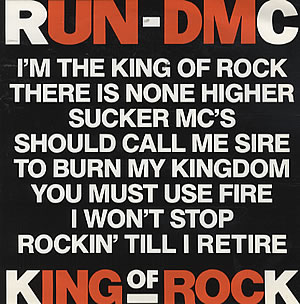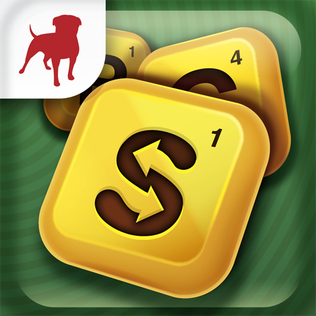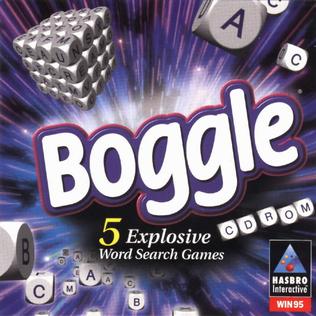Paper-and-pencil games or paper-and-pen games are games that can be played solely with paper and pencils, usually without erasing. Examples of paper-and-pencil games are Tic-tac-toe, Sprouts, and Dots and Boxes. Other examples include: Hangman, Connect 5, M.A.S.H., Boggle, Battleships, Paper Soccer, Golf, WedgoLogic, and MLine.
Boggart is one of numerous related terms used in English folklore for either a household spirit or a malevolent genius loci inhabiting fields, marshes or other topographical features. Other names of this group include bug, bugbear, bogey, bogun, bogeyman, bogle, etc., presumably all derived from Old English pūcel, Irish púca and Welsh bwg with the same meaning.
A puzzle is a game, problem, or toy that tests a person's ingenuity or knowledge. In a puzzle, the solver is expected to put pieces together in a logical way, in order to arrive at the correct or fun solution of the puzzle. There are different genres of puzzles, such as crossword puzzles, word-search puzzles, number puzzles, relational puzzles, or logic puzzles.

An ogre is a legendary monster usually depicted as a large, hideous, man-like being that eats ordinary human beings, especially infants and children. Ogres frequently feature in mythology, folklore, and fiction throughout the world. They appear in many classic works of literature, and are most often associated in fairy tales and legend with a taste for infants.
A folktale or folk tale is a folklore genre that typically consists of a story passed down from generation to generation orally, and may refer to:
Scott Kim is an American puzzle and computer game designer, artist, and author of Korean descent. He started writing an occasional "Boggler" column for Discover magazine in 1990, and became an exclusive columnist in 1999, and created hundreds of other puzzles for magazines such as Scientific American and Games, as well as thousands of puzzles for computer games. He was the holder of the Harold Keables chair at Iolani School in 2008.
This page lists board and card games, wargames, and miniatures games published in 1972. For video and console games, see 1972 in video gaming.
Boggle is an American game show that was broadcast on The Family Channel from March 7 to November 18, 1994. It was based on the board game of the same name. Wink Martindale was the host, and Randy West was the announcer.
Momotaro Densetsu is a role-playing video game series in Japan featuring the character Momotarō from Japanese folklore, as well as other Japanese folklore characters such as Kintarō, Urashima Tarō, and Princess Kaguya of The Tale of the Bamboo Cutter. The first game in franchise, Momotaro Densetsu: Peach Boy Legend, had shipped 1 million copies in Japan.
Jumble was an American game show that was broadcast on The Family Channel, running from June 13 to September 2 and from November 21 to December 30, 1994. It was based on the newspaper game of the same name. Wink Martindale hosted, while Randy West was the announcer.

"King of Rock" is a 1985 single by Run–D.M.C. and the title track from their album King of Rock. It was featured on the video games Guitar Hero: Aerosmith, Thrasher: Skate and Destroy, Call of Duty: Infinite Warfare, and is a downloadable track on Rock Band 3. The song was sampled for Michael Jackson's song "2 Bad" and was performed by the group at the 1985 Live Aid concert. Eddie Martinez is the song's lead guitarist and appears in the video.
Family Game Night is an American television game show based on Hasbro's family of board games and EA's video game franchise of the same name. The show is hosted by Todd Newton. Burton Richardson announced for the first two seasons, until he was replaced by Stacey J. Aswad for the third season, and then Andrew Kishino beginning in the fourth season. The 60-minute program debuted on October 10, 2010 on the new channel, The Hub, formerly Discovery Kids. The network would become Discovery Family on October 13, 2014; it was previewed on October 9, 2010 on its sister channel, TLC. Seasons 1 through 3 each contained between 20 and 30 episodes. Seasons 4 and 5 each contained 15 episodes. Season two premiered on Friday, September 2, 2011, and new games were added. The games added to the second season included Cranium Brain Breaks, Green Scream, Ratuki Go-Round, Simon Flash, Operation Sam Dunk, Trouble Pop Quiz, and Spelling Bee.

Word Streak is a word game developed by Zynga with Friends for iOS and Android and released in January 2012. Gameplay is similar to that of Boggle—players try to find as many words as possible in a jumbled 4x4 grid of letters by connecting adjacent letters to form words within a two-minute time frame - though with extra features and a different scoring system. Words may be formed vertically, horizontally, and diagonally. Scramble with Friends is one of the top ranking games in the iOS application store, available as both a free ad-supported version and an ad-less paid version. Scramble with Friends replaced Scramble Challenge at the end of 2011, but did not retain the solitaire option of the latter.

WordZap is a puzzle video game designed by Michael F.C. Crick, son of scientist Francis Crick. In 1991, it was included with Volume 3 of the Microsoft Entertainment Pack and was later released by Jaleco for the Game Boy in 1992. An updated version for newer editions of Microsoft Windows is available on the game's official website as shareware. The game has been compared with Scrabble and Boggle; in WordZap, players race to make words proper English words to fill their rack of words, but when one player makes a word already found by the other player, the word is "zapped" from both player's racks. Each round ends when either one player fills the word rack, or time runs out without either player being able to make another word.

Puzzlejuice is a 2012 indie puzzle video game for iOS produced and developed by video game company Sirvo. The game is a combination of Tetris, tile-matching, and Boggle: players rearrange falling tetromino blocks into rows of similar colors, which turn into letters that are cleared from the board by forming words. The fast-paced game also includes challenges and power-ups. The development team consisted of three people; programmer Asher Vollmer initially developed the game alone, before reaching out to artist Greg Wohlwend for advice on the aesthetics. Composer Jimmy Hinson produced the game's music.

SpellTower is a puzzle video game by Zach Gage in which the player creates words from a jumble of letter tiles to clear the screen before it refills. The game has several game modes and a multiplayer battle mode. The impetus for the game—the concept of combining elements from Tetris and Boggle in what was a prototype of the puzzle video game Puzzlejuice—inspired Gage to create SpellTower. The game released for iOS in November 2011 to generally favorable reviews. Versions for OS X and Android followed over the next two years. In 2017 SpellTower Minutes was released. This browser-based Flash game created special "blitz" like modes not found in the mobile releases. A new iOS version released in 2017 swapped out the unnamed dictionary and began using Merriam-Webster's Third New International Dictionary, Unabridged. French and Dutch language specific versions were also released.





